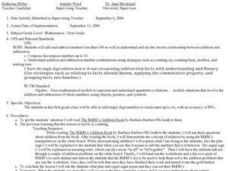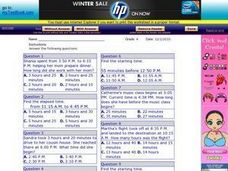Curated OER
Everyday Heroes You Can Be One, Too
Students listen to a read aloud of Alan Baker's, White Rabbit's Color Book while identifying shapes and lines throughout the book. They use shapes and different types of lines to create a bunny of their own. They must use five shapes to...
Curated OER
Counting on Frank
Eighth graders read a book "Counting on Frank" with a partner. Using the text, they identify eight clues and use their mathematical reasoning in real-life situations. They participate in a game and turn in a notebook in which they write...
Curated OER
Shapes
Learners participate in a number of hands-on shape-related activities. They match and sort shapes by attribute, read books about shapes, complete shape art projects and explore and compare parts of shapes.
Curated OER
Classroom Supplies
Challenge young mathematicians to buy classroom supplies by staying within the means of a $1,000 budget. The mathematical activity provides learners with the opportunity to decide what items from the supply list would benefit a class of...
Curated OER
So Many Cats!
First graders listen to the book, So Many Cats, and discuss the number of cats in the story. They demonstrate simple addition problems using cat counters and a work mat in the shape of a house.
Curated OER
Geo Shapes
First graders listen as the book, "Try It With Triangles" is read to the class. They name the geometric shapes that they see in the story and view the Shape Vocabulary Cards as they name them from the book. They then cut out the...
Curated OER
Berlioz the Bear
Young children read the story, Berlioz the Bear and complete various reading and writing activities. They learn about fiction and non-fiction, and complete graphing and writing activities for the story. Youngsters draw the bear and use...
Curated OER
Learning about Fibonacci
In this learning about Fibonacci worksheet, students read about Leonardo Fibonacci and his contribution to mathematics, then study the pattern of Fibonacci numbers, in math and in nature.
Curated OER
What's The Story?
Teams of learners integrate reading, writing, math, social studies, and science in this simple, yet effective lesson. They work in groups in order to solve a ten-step problem which requires internet research, the use of a calculator, and...
Curated OER
One-digit Division
Young mathematicians read the book, The Doorbell Rang. They examine the necessity of division in everyday life, such as cooking and sharing. They use paper cookies to construct equivalent sets.
Curated OER
M & M Addition
Eat your math manipulatives, are you serious? Yup, Learners listen to the story The M & M's Addition book, add single digit numbers to reach sums up to six, and demonstrate addition and subtraction number combinations using several...
Curated OER
Word Problems: Addition and Subtraction
Word problems build reading comprehension and problems solving skills. Here is a set of 10 basic word problems that involves both addition and subtraction using the numbers 1-10.
Curated OER
How Big is a Foot?
Introducing measurement can be as simple as reading a book and then using measurement tools to understand how big a foot really is. The class reads and discusses the book How Big is a Foot? by Rolf Myller, stopping often to consider...
Curated OER
Fractions
Students determine that a fraction is a part of a whole or part of a group. They write and read fractions and solve various fraction problems. They create their own fraction problem using colored candies for their classmate to solve.
Curated OER
Word Problems Involving Time
Ten short word problems are provided for learners to practice identifying elapsed time. The presentation is slightly confusing, but you could consider cutting out each problem and providing one a day as a bell-ringer.
Curated OER
3-D Figures Part 1
Elementary schoolers explore 3-D shapes. They transition from thinking of shapes as only 2-D. Pupils read Cinderella as a launching activity for their upcoming adventure, and explore a new world of 3-D shapes in this introductory lesson.
Math Worksheets Land
Percent Error and Percent Increase - Matching Worksheet
Calculating percent change is a handy tool to understand sales, discounts, and other numerical changes we come across. Here, activity practices percent change and percent error with a variety of problems to let your learners see how...
Curated OER
Numbers and Counting
Students explore the numbers one through five. Over a three week period, students visit centers in the room to investigate and perform hands-on activities with numbers. They trace numbers, write numbers in shaving cream, count objects,...
Curated OER
Interpreting Data from Birdfeeders
What kinds of birds live in your area? Read a book about birds to your learners and explore their feeding patterns. Charts and graphs are provided in this three page packet, but consider assigning the basic questions if using with young...
Curated OER
Anno's Mysterious Multiplying Jar
Upper graders write word problems and research the uses of multiplication. They start off by taking a pre-test on multiplication and then read the book, Anno's Mysterious Multiplying Jar. They make up word problems to go with their...
Curated OER
Place Value Tens and Ones
Students use manipulative to identify the ones and tens digit in a number, use pictorial representation to identify the ones and tens digit in a number and determine the value of a number given tens and ones.
Curated OER
Things in Groups Puzzles
In this grouping puzzles worksheet, 7th graders solve and complete 8 different problems that include grouping in various puzzles. First, they read the clues given in each box to solve the puzzle. Then, students create their own puzzle...
Curated OER
Anno's Magic Seeds
Read a tale for your class as they unravel patterns presented in the story using manipulatives. Pause to allow time for discussion and explanation of solutions throughout the story. They write equations or expressions with order of...
Curated OER
Graphing Our Marbles
Students collect information pertaining to marble colors found in their bag; then creating a spreadsheet in order to make a chart representing their findings using Microsoft Excel. Students will present their results to small groups.























